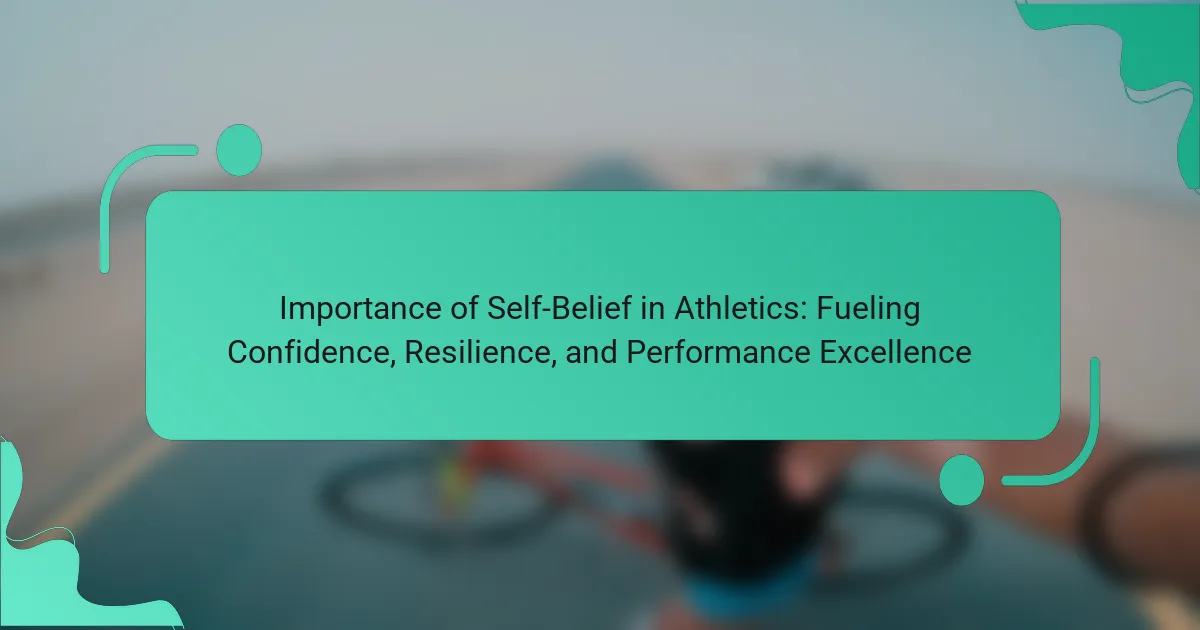Self-belief is crucial for athletes, significantly enhancing their confidence, resilience, and performance. It fosters a positive mindset, enabling goal-setting and perseverance. Techniques like visualization and positive affirmations can cultivate self-belief, while support from coaches and peers helps combat self-doubt. Ultimately, a strong mental framework is essential for achieving excellence in sports.

How Does Self-Belief Impact Athletic Performance?
Self-belief significantly enhances athletic performance by fostering confidence, resilience, and the pursuit of excellence. Athletes with strong self-belief tend to set higher goals and demonstrate greater perseverance during challenges. Studies show that self-belief can lead to improved focus and reduced anxiety, which are critical during competitions. Furthermore, athletes who trust their abilities are more likely to engage in consistent training, ultimately enhancing their skill levels. Emphasizing mental conditioning alongside physical training can create a holistic approach to maximizing performance in sports.
What Role Does Self-Talk Play in Building Self-Belief?
Self-talk significantly enhances self-belief in athletes by fostering a positive mindset. Positive self-talk reinforces confidence, helping athletes overcome challenges and maintain resilience during competition. Research shows that athletes who engage in constructive self-talk experience improved performance metrics, such as faster reaction times and better focus. This mental strategy can be pivotal, as it transforms doubt into motivation, ultimately driving performance excellence.
How Can Inner Dialogue Enhance Resilience in Athletes?
Inner dialogue significantly enhances resilience in athletes by fostering self-belief. Positive self-talk strengthens mental fortitude, enabling athletes to overcome challenges. Research indicates that athletes with strong inner dialogue exhibit higher levels of confidence, which directly correlates to improved performance outcomes. This internal narrative acts as a buffer against stress, allowing athletes to maintain focus and composure during competitions. By cultivating a constructive inner dialogue, athletes can transform setbacks into learning experiences, ultimately enhancing their overall resilience.
What Techniques Improve Positive Self-Talk?
Positive self-talk can be improved through techniques like visualization, affirmations, and mindfulness practices. Visualization helps athletes mentally rehearse success, enhancing confidence. Affirmations reinforce self-belief by repeating positive statements, fostering a resilient mindset. Mindfulness practices cultivate awareness and control over negative thoughts, promoting a positive internal dialogue. These techniques collectively enhance performance excellence by strengthening self-belief.
How to Identify Negative Inner Dialogue?
Negative inner dialogue often manifests as self-doubt or criticism, undermining self-belief. To identify it, pay attention to recurring negative thoughts, especially during performance-related situations. Recognizing phrases like “I can’t” or “I’ll fail” is crucial. These thoughts can diminish confidence and resilience, impacting athletic performance. By acknowledging and reframing this dialogue, athletes can enhance their self-belief and overall performance excellence.

What Are the Universal Benefits of Self-Belief in Sports?
Self-belief in sports significantly enhances athletes’ confidence, resilience, and overall performance. It fosters a positive mindset, enabling athletes to overcome challenges and achieve their goals.
Athletes with strong self-belief demonstrate higher levels of motivation, leading to consistent practice and improvement. This intrinsic motivation is crucial for maintaining discipline during training and competition.
Moreover, self-belief acts as a buffer against stress and anxiety. Athletes who trust in their abilities are better equipped to handle pressure, resulting in improved performance during critical moments.
Additionally, self-belief contributes to goal-setting and achievement. Athletes with confidence are more likely to set ambitious goals and pursue them vigorously, ultimately leading to greater success in their sports careers.
How Does Confidence Influence Competitive Edge?
Confidence significantly enhances competitive edge by fostering self-belief, which directly impacts performance and resilience. Athletes with high self-confidence exhibit improved focus, better decision-making, and a greater ability to handle pressure. Research indicates that self-belief can lead to a 20% increase in performance metrics. Additionally, confident athletes are more likely to set ambitious goals and persist through challenges, further solidifying their competitive advantage.
What Connection Exists Between Self-Belief and Mental Toughness?
Self-belief significantly enhances mental toughness, driving athletes to overcome challenges. Strong self-belief fosters resilience, enabling athletes to maintain focus under pressure. Research indicates that athletes with high self-belief demonstrate improved performance and adaptability, showcasing the direct link between confidence and mental strength. This connection is crucial for achieving excellence in competitive environments.

What Unique Strategies Can Athletes Use to Cultivate Self-Belief?
Athletes can cultivate self-belief through visualization, positive affirmations, and goal-setting. Visualization involves imagining successful performances, enhancing mental readiness. Positive affirmations reinforce self-worth, building resilience against setbacks. Goal-setting provides clear milestones, fostering a sense of achievement. These strategies collectively enhance confidence and performance excellence in athletics.
How Can Visualization Techniques Enhance Self-Talk?
Visualization techniques significantly enhance self-talk by creating mental imagery that reinforces positive beliefs. This practice helps athletes build confidence, improve focus, and foster resilience. For instance, visualizing successful performances can lead to a more robust self-belief, which is crucial for peak athletic performance. Studies show that athletes who utilize visualization report higher levels of confidence and better outcomes in competitions. By integrating these techniques into their training, athletes can effectively transform their self-talk into a powerful tool for achieving excellence.
What Role Do Affirmations Play in Athletic Success?
Affirmations significantly enhance athletic success by fostering self-belief. They cultivate confidence, resilience, and peak performance. Athletes who regularly use affirmations report improved focus and motivation, leading to better outcomes in training and competition. Research indicates that positive self-talk can reduce anxiety and enhance mental toughness, essential qualities for high-level performance.

What Are the Rare Attributes of High Self-Belief in Professional Athletes?
High self-belief in professional athletes is characterized by rare attributes that significantly enhance their performance. These attributes include an unwavering commitment to personal goals, a unique ability to visualize success, and an exceptional level of mental resilience. Athletes with high self-belief often display a rare capacity for self-reflection, enabling them to learn from failures effectively. This combination of attributes not only fuels their confidence but also contributes to their overall excellence in performance.
How Do Elite Athletes Maintain Self-Belief Under Pressure?
Elite athletes maintain self-belief under pressure through mental strategies, training, and support systems. They cultivate a strong sense of self-efficacy, which enhances resilience and performance. Techniques such as visualization and positive self-talk reinforce their confidence, allowing them to thrive in high-stakes situations. Research shows that athletes who focus on their strengths and past successes are better equipped to handle pressure. Additionally, having a solid support network, including coaches and teammates, provides emotional reinforcement, further solidifying their self-belief.
What Are the Long-Term Effects of Sustained Self-Belief?
Sustained self-belief significantly enhances athletic performance, resilience, and overall confidence. Athletes with strong self-belief often exhibit improved mental toughness, enabling them to overcome challenges and setbacks effectively. Research shows that self-belief correlates with higher achievement levels, as athletes are more likely to set ambitious goals and pursue them relentlessly. Additionally, this mindset fosters a growth-oriented attitude, promoting continuous improvement and adaptability in training and competition.

How Can Athletes Overcome Self-Doubt?
Athletes can overcome self-doubt by cultivating self-belief, which enhances confidence, resilience, and performance. Building a strong mental framework is essential for athletes to achieve excellence. Techniques such as visualization, positive affirmations, and setting realistic goals can significantly boost self-belief.
Research shows that athletes with high self-belief are more likely to perform well under pressure. For instance, a study found that 75% of elite athletes attribute their success to a strong belief in their abilities. Additionally, developing a growth mindset allows athletes to view challenges as opportunities for improvement, further reinforcing their confidence.
Support from coaches and peers also plays a crucial role in overcoming self-doubt. Constructive feedback and encouragement can help athletes recognize their strengths and progress. As a result, a supportive environment fosters a culture of belief, enabling athletes to thrive.
In summary, self-belief is a vital attribute for athletes, influencing their performance and resilience. By implementing mental strategies and fostering a supportive network, athletes can effectively combat self-doubt and achieve their goals.
What Best Practices Foster a Positive Inner Dialogue?
Positive inner dialogue is fostered by self-affirmation, visualization, and mindfulness practices. These strategies enhance self-belief, which is crucial for athletic performance. Self-affirmation involves repeating positive statements that reinforce confidence and resilience. Visualization helps athletes mentally prepare by imagining successful performances, which boosts motivation. Mindfulness practices, such as meditation, reduce anxiety and improve focus, further supporting a positive mindset. Together, these methods cultivate an empowering inner dialogue that drives excellence in athletics.
What Common Mistakes Should Athletes Avoid in Self-Talk?
Athletes should avoid negative self-talk, overgeneralization, and comparisons to others. These mistakes undermine self-belief and hinder performance. Negative self-talk creates doubt, while overgeneralization leads to a fixed mindset. Comparing oneself to others distracts from personal goals and progress. Fostering positive affirmations and focusing on individual strengths enhances resilience and confidence.
How to Create a Personalized Self-Belief Action Plan?
Creating a personalized self-belief action plan involves setting clear goals, identifying strengths, and developing a supportive environment. Start by defining specific, measurable objectives that enhance your self-belief in athletics. Next, recognize your unique attributes, such as resilience and determination, which contribute to performance excellence. Incorporate daily affirmations and visualization techniques to reinforce confidence. Finally, surround yourself with a positive support system, including coaches and peers, to maintain motivation and accountability.
